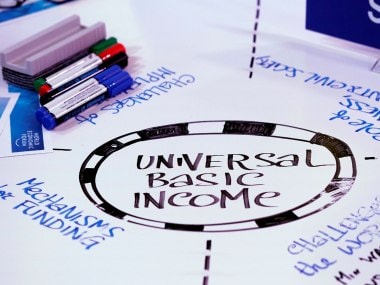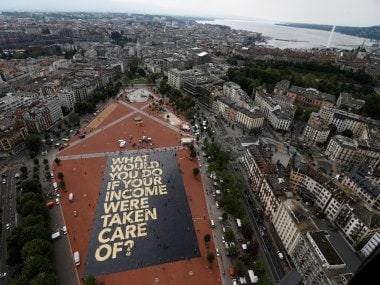Universal basic income, until Rahul Gandhi’s promise of it on Monday, is a concept which has so far had little traction in our part of the world. Even though the rate of unemployment is high and poverty levels higher, the sheer number of people in India have made the promise of monetary support to one and all a distant dream.
Although the scheme hinges on the basic premise of eliminating poverty, the overwhelming intricacies of employing a direct cash payment to an entire population has led to it being limited to some of the most prosperous countries and cities. Even there, it operates on an experimental basis. No country till now has adopted a full basic income.
The world over, thinkers and doers are united in the assumption that the system of ensuring a basic income is a solution to do away with inequality. The Basic Income Earth Network, a charitable portal that traces the intricacies of the concept, defines it as “a periodic cash payment unconditionally delivered to all on an individual basis, without means-test or work requirement.”

While it does delineate the underlying clauses in declaring a monetary scheme as a universal basic scheme, the definition is in no way binding. For one, even schemes like the one promised by Rahul, tackles households and not individuals are considered part of the universal basic income (UBI) ambit. More importantly, unique socioeconomic conditions of a country call for amendments to the nature of cash payment.
Whatever the nature of the UBI system to which a government subscribes, at its core, it attempts to do away with the inherent exploitation in a labour contract. With a cash support in his or her bank, a person is more likely to seek out jobs he or she wants to do, making it easier for employers and employees to have a more equal relationship.
Resurgence of an idea
Not unsurprisingly, the resurgence of UBI as a possible method to ensure subsistence has come from the very site which holds traditional modes of worker-owner relationships hostage — Silicon Valley. From Elon Musk and Mark Zuckerberg to countless start-up wizards, Forbes notes that the concept finds favour among young geniuses because it belies their fear in the future of a world where robots will soon take over the job market.
The fruits of labour, in an artificial intelligence-run utopia, would be divided among those who stand to lose the most from this shift in labour dynamics. However, the report sheds light on the fact that if indeed jobs are taken up by machines, then what would those receiving minimum income have left to aspire to? Not much, and that would mean a stagnant, unemployed, assisted labour force.
Ruthless, America’s capitalism may be, but it has often tried to arrive at a strong and targeted safety net for those it has thrown out of its ambit. Here, it has proven difficult to strike a balance between assistance and incentive. A report on Wired highlights how difficult it would be to actually bring about a concept like the UBI in a country like America, with its predilection for protecting wealth so firmly ingrained in its economy that there exists laws that reduces taxes for the rich. This, even though a basic cash payment has seen rousing support from both the conservative and liberal side of the political spectrum.

One of the lingering doubts left by the UBI is its long term effects. The World Social Science Report 2016, co-published by UNESCO, notes the near universal success of the concept in trials.
In the United States and Canada in the 1970s there were a number of randomised trials, most notably in Seattle and Denver, in which randomly selected low-income individuals received a UBI.
In India, notes the report, eight villages were selected in 2011 and all its residents were given a minimum income. “In all of these experiments, receiving a UBI significantly improved the lives of people while having at most a modest effect on labour force participation,” it noted. While this spells good fortune for the US and Canada, whether a country like India — with a chunk of its population involved in non-contractual agricultural labour — can reflect the success of the scheme is suspect.
In Ontario, Canada, people living in two cities and a town have been a part of an ongoing trial since June, 2017. Barcelona and Scotland are also in the middle of their own own basic income experiments, launched in October 2017. In all these countries, the number of people involved in such trials has not exceeded 2,000.
Finland’s experiment
Finland is among few countries that have launched a trial of the UBI with a view to rolling out the scheme soon. CNBC reports that at the beginning of 2017, as many as 2,000 unemployed people were corralled to receive €560 each month for two years. Researchers will assess how the free money affects recipients’ incentive to work, and the Finnish government hopes it might reduce bureaucracy in the existing welfare system.

But in a separate report, Wired notes how Finland has been quick to clarify that it has no plans of rolling out an UBI scheme any time soon. “There are no plans to continue or expand the experiment after 2018,” the site quoted Miska Simanainen, a researcher at Kela, the Finnish government agency behind the trial as having said.
The results from the trial, which will determine the future of the UBI rollout, will be available by the end of 2019 or the beginning of 2020, Simanainen had added.
An expensive scheme
Another Wired report also reflects on how schemes like these are at the mercy of the political inclination of governments. Days after the experiment was started by Kela, Finland’s conservative government had begun tweaking the proposal, most importantly eliminating the part of the plan that paid people who had jobs, and only providing UBI for those receiving unemployment benefits instead.
Finland’s skepticism is, to a large extent, due to the absolutely irrefutable fact that a UBI system (even in the form of a trial) is expensive. For some countries, reports Financial Times, it might prove devastatingly so.
The paper quotes a study on UBI proposals by the Organisation for Economic Co-operation and Development, and reflects on the fact that even in the organisation’s relatively advanced member countries, “big tax rises and reductions in other benefits would be needed, even for a modest basic income” for its entire population.
The report calculates that in France, UBI would require an increase in income taxes of 5.6 percent of gross domestic product (GDP) and a reduction of other benefits of 5.3 percent of GDP. In Finland, it would require income tax increases of over 10.2 percent of GDP, and benefit reductions of 6.7 percent of GDP.
That the realities of India are vastly different from that of France and Finland. Where smaller, richer countries have shied away, if India does indeed bring about an UBI scheme, it will, as have been said before, undoubtedly the biggest in the world.
source: Firstpost.com







































